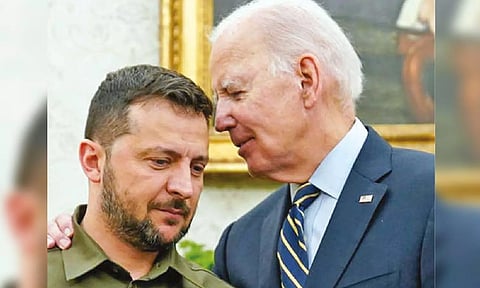

• CHRISTOPH HASSELBACH
US President Joe Biden famously vowed to support Ukraine “as long as necessary.” This was echoed by German Chancellor Olaf Scholz and also stated in the final communique of the recent NATO summit. But, since the Hamas terror attack on Israel on October 7, a new international crisis has evolved, distracting the attention of the world public. Further aid has been thrown into question in the United States, which is by far the most important supporter of Ukraine. According to the White House, the funds previously approved by the US Congress for Ukraine will have been used up by the end of the year. However, the release of new aid is being blocked by the Republicans in Congress. More and more of Republican legislators are expressing doubts about support for Kyiv or rejecting it altogether.
This would benefit Russia. Ukrainian President Volodymyr Zelenskyy recently urged NATO countries not to slacken their support, saying Russia would try to exploit the situation in the Middle East. In a dramatic appeal, Andriy Yermak, the head of the presidential office, warned that Ukraine would lose the war against Russia without US help. The tide regarding Ukraine support had turned in the United States well before the current Israel-Hamas war broke out, said political scientist Johannes Varwick, of the University of Halle. There is “competition for attention and resources. I don’t think major players will stop supporting Ukraine now, but priorities will shift,” he told DW.
Solidarity with Ukraine has been waning in the European Union. Hungary’s Prime Minister Viktor Orban has announced he would veto both a further 50 billion euros for Kyiv and the start of EU accession negotiations at the upcoming EU summit in mid-December. Orban continues to maintain contact with Vladimir Putin and has consistently tried to prevent EU sanctions against Russia. Earlier this year, the Polish government temporarily threatened to halt weapons deliveries out of anger over cheap Ukrainian grain imports. Slovakia, until now also a big Ukraine supporter, has changed its tune following the election of Robert Fico, who vowed during his campaign that under his leadership Slovakia would supply “not one shot of ammunition” to Ukraine, while calling for better relations with Russia.
In the West as a whole, “support for Ukraine has already waned, cohesion is crumbling, voices are growing louder calling for a ‘dictated peace,’” in which a weaker Ukraine would be forced to accept terms set by a stronger Russia, defense policy expert and conservative German lawmaker Roderich Kiesewetter told DW.
Roman Goncharenko of DW’s Ukrainian desk told DW’s “To the Point” program in October that “there is disillusionment in Ukraine that the West has grown tired.”
Western weapons deliveries have enabled Ukraine to repeatedly achieve limited military success in its counteroffensives, but a breakthrough has so far failed to materialize. Once again, Zelenskyy is asking for weapons from the West, such as combat aircraft. From Germany, he wants Taurus cruise missiles. But Chancellor Scholz is unwilling to supply them. And a majority of Germans surveyed by pollster YouGov earlier this year, support his decision. The constant hesitation is precisely the problem, Kiesewetter said. “The liberation offensive is being hampered by the West itself because too little is being delivered too late,” he argued.